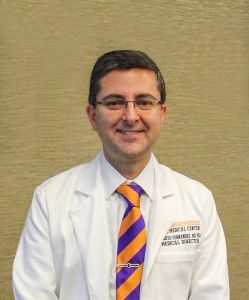
The Henley Street Bridge overlooking the Tennessee River in Knoxville on the evening of Coach Pat Summitt’s death, June 28th, 2016
“If I’m not leading by example, then I’m not doing the right thing. And I always want to do the right thing.”
Pat Summitt (1952-2016)
In 2011, Hall-of-Fame Coach and sporting legend, Pat Summitt, was diagnosed with early onset dementia, Alzheimer’s type, a disease that affects over 5.5 million Americans. Just a short 5 years afterward, the winningest coach in basketball, men’s or women’s, took one of very few losses in her life – though this was certainly the greatest. On June 28th, 2016, surrounded by “those who love her most“, Coach Pat, like so many before her, succumbed to Alzheimer’s far too early.
 In true Coach Pat form, she found a way to rise above any loss. Upon learning of her diagnosis in 2011, she immediately put up her next fight. Her formation of The Pat Summitt Foundation just a few months afterward was more than just a characteristic show of her force, but an effective call to arms for those around her. In her own words, this call was to increase awareness, advocacy, and research about the 6th leading cause of death in the US, Alzheimer’s disease.
In true Coach Pat form, she found a way to rise above any loss. Upon learning of her diagnosis in 2011, she immediately put up her next fight. Her formation of The Pat Summitt Foundation just a few months afterward was more than just a characteristic show of her force, but an effective call to arms for those around her. In her own words, this call was to increase awareness, advocacy, and research about the 6th leading cause of death in the US, Alzheimer’s disease.
In the words of then-chancellor of UT, Jimmy Cheek upon hearing of her diagnosis, “You will always be our coach!” Today, we researchers and clinicians echo these sentiments and look to her example as we try our best to channel even a fraction of her work ethic, leadership, prowess, and winning success as we endeavor to see her wishes come true.

Thanks to a generous contribution from The Pat Summitt Foundation and a strategic partnership with The University of Tennessee Medical Center, The Pat Summitt Clinic opened its doors just a little over a year ago and is already well on its way toward the goal of serving 6,000 patients and families. This is exceptional given that it is estimated that by the year 2025, more than 160,000 Tennesseans are expected to have been diagnosed with Alzheimer’s disease.
On behalf of the Brain Awareness Campaign at The University of Tennessee, we’d like you to join The Psychology Graduate Student Association, The Advancement of Neuroscience at UTK Club, and The Neuroscience Graduate Student Organization on March 22nd as we show that “We Back Pat” and share with you just some of the many fruits of Coach Pat Summitt’s labor to fight against Alzheimer’s disease.
In this event, we will feature the work of clinicians at The Pat Summitt Clinic, including the clinic’s Medical Director, Dr. Roberto Fernandez as well as one of their many licensed, on-site social workers and neuropsychologists. Meet the panel members and others in this fight before the event at 6:30pm as we’ll serve refreshments in the Atrium of the beautiful Art and Architecture Building on UT’s Knoxville Campus. You can read more about this event HERE! as well as below.
Do you have any specialized needs? Let us know HERE! and we’ll make accommodations!
Want to reserve your seats? You can do so HERE!
Need directions or to know where to park? Click HERE!

 Sallie Gentry, LCSW, is an East Tennessee native and graduated from the University of Tennessee with a Master’s degree in Social Work. She is a Licensed Clinical Social Worker and a Certified Case Manager working in several different fields of social work. Currently she is working with those affected by neurological conditions at The Pat Summitt Clinic. Sallie also has a personal connection to Alzheimer’s, as her grandmother was diagnosed in 2011.
Sallie Gentry, LCSW, is an East Tennessee native and graduated from the University of Tennessee with a Master’s degree in Social Work. She is a Licensed Clinical Social Worker and a Certified Case Manager working in several different fields of social work. Currently she is working with those affected by neurological conditions at The Pat Summitt Clinic. Sallie also has a personal connection to Alzheimer’s, as her grandmother was diagnosed in 2011.
